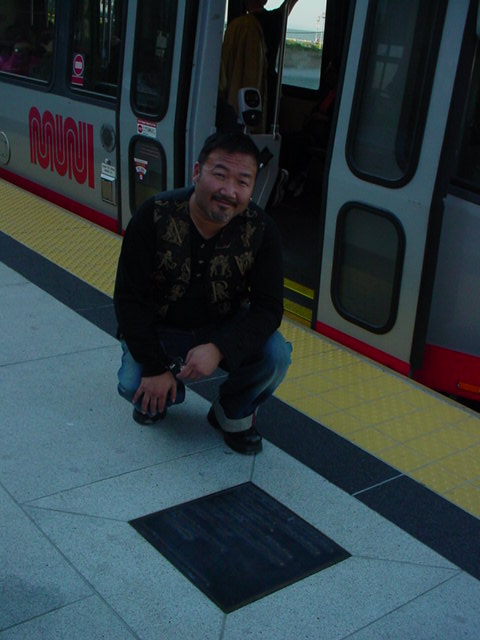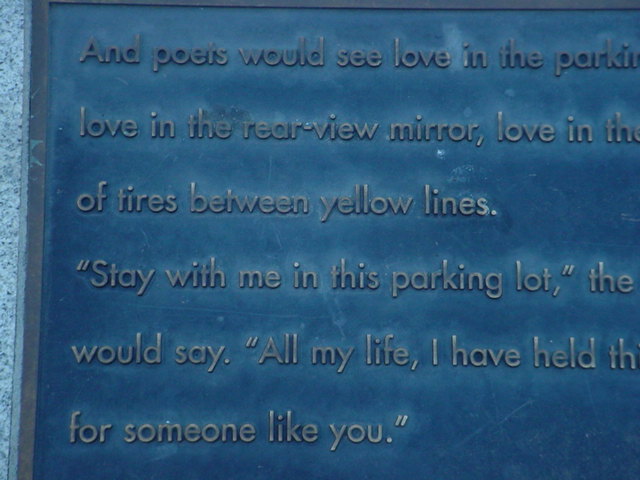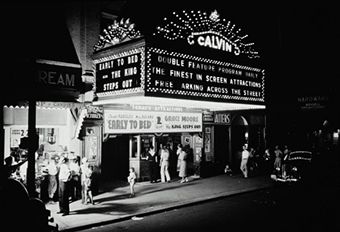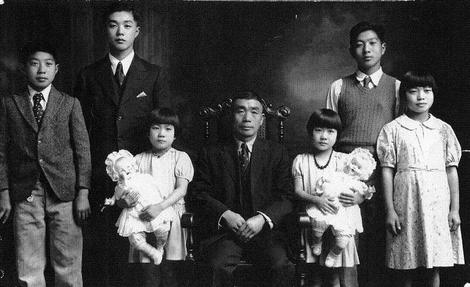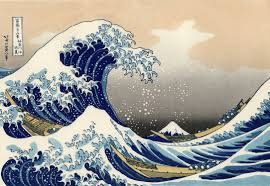BACKGROUND ON
"NOTES FOR A POEM ON BEING ASIAN AMERICAN"
I get many emails from students writing about my poems who want to know my insights into my poems. But sometimes I think it's more important to ask -- what are your own insights into the poem? For the poem must stand on its own.
That being said -- I wrote the poem "Notes for a Poem on Being Asian American" specifically for a reading I was giving at a theater for Asian American Heritage Month. The two main characters in the poem -- the man who says he was on the plane that bombed Hiroshima and the Iranian cabdriver -- are both people I really met. There are things that happen to Asian Americans that don't happen to others, so I wanted to share the strangeness of that experience. When the man came up to me who said he was on that plane -- it was like he was continuing a conversation that started 50 years ago and had never stopped. And whether or not he was actually on that plane -- he thought he was. The cabdriver questioning my ethnicity is not nearly as "American" as I am, not nearly as home here -- yet it is my nationality that is called into question.
The central image of the egg serves as a metaphor. In the beginning, I'm trying to sort out the Asian in me from the American. By the poem's end, I'm looking at the egg differently. I'm accepting that it's more important to find the similarities in people than the differences.
When this poem was published in the anthology UNSETTLING AMERICA (Penguin) and later in NORTON'S INTRODUCTION TO LITERATURE -- unfortunately, the last stanza of this poem was omitted. What follows is the missing stanza:
and says, "Can you really tell the difference between
a Chinese and a Japanese?"
And I look at his 3rd World face, his photo I.D. pinned
to the dashboard like a medal, and I think of the eggs
we try to separate, the miles from home he is and the
minutes from home I am, and I want to say: "I think
it's more important to find the similarities between
people than the differences." But instead I simply
look into the mirror, into his beautiful 3rd World
eyes, and say, "Mr. Cabdriver, I can barely tell the
difference between you and me."
DWIGHT OKITA
Words can fly.
My poem "Crossing with the Light" is immortalized on a bronze plaque in San Francisco at the Folsom Street stop of the train that runs beside the Embarcadero.
Poetry & Plays.
POEMS FROM CROSSING WITH THE LIGHT
For some reason, the LOOK INSIDE preview option on Amazon doesn't work for my poetry book. So I thought I'd allow folks to preview some work here:
"IN RESPONSE TO EXECUTIVE ORDER 9066: All Americans of Japanese Descent Must Report to Relocation Centers"
by Dwight Okita
Dear Sirs:
Of course I'll come. I've packed my galoshes
and three packets of tomato seeds. Denise calls them
love apples. My father says where we're going
they won't grow.
I am a fourteen-year-old girl with bad spelling
and a messy room. If it helps any, I will tell you
I have always felt funny using chopsticks
and my favorite food is hot dogs.
My best friend is a white girl named Denise --
we look at boys together. She sat in front of me
all through grade school because of our names:
O'Connor, Ozawa. I know the back of Denise's head very well.
I tell her she's going bald. She tells me I copy on tests.
We're best friends.
I saw Denise today in Geography class.
She was sitting on the other side of the room.
"You're trying to start a war," she said, "giving secrets away
to the Enemy. Why can't you keep your big mouth shut?"
I didn't know what to say.
I gave her a packet of tomato seeds
and asked her to plant them for me, told her
when the first tomato ripened
she'd miss me.
MY STAGE PLAYS INCLUDE:
"RICHARD SPECK" -- Produced & commissioned by American Blues Theatre as part of the show "MONSTERS: Tales of Urban Lunacy I," featuring a stunning performance by actress Lee Chen. This is a darkly comic monolog about serial killers, parakeets, and health insurance.
"THE RAINY SEASON" -- Produced by Zebra Crossing/ Avenue Productions. This is your typical Asian American boy meets South American boy story, featuring a moving performance by actress Cheryl Hamada as the hero's mother. Chance of precipitation...very likely. The play is published in the book ASIAN AMERICAN DRAMA, edited by Brian Nelson. Staged reading at East West Players in LA.
"THE HIROSHIMA PROJECT" -- Produced by Bailiwick Repertory.
A collaboration by Anne V. McGravie, Dwight Okita, Nicholas Patricca and David Zak. The show is also known as "The Radiance of A Thousand Suns" published by Dramatic Publishing. This was written to coincide with the 50th anniversary of the atomic bomb.
"THE SALAD BOWL DANCE" -- Produced & commissioned by The Chicago Historical Society in collaboration with Angel Island Theatre Company. This was also performed in LA as part of the HBO New Writers Project with Tamlyn Tomita in the lead role. Developed in part at Chicago Dramatists.
"LETTERS I NEVER WROTE" -- Staged readings at Victory Gardens Theatre and Chicago Dramatists Workshop. A play about a Japanese American girl in the internment camps with a gift for conjuring letters to those who need them.
BACKGROUND ON "IN RESPONSE TO EXECUTIVE ORDER 9066"
"In Response to Executive Order 9066" is one of my most anthologized, reprinted poems. Every year I get several requests from students and teachers studying the piece, as well as from publishing houses wishing to reprint it. I have written some notes which I hope will be helpful to all of you. And thanks for your interest in my work.
I wrote "9066" sometime around 1982. It was promptly published for the first time in the Asian American poetry anthology BREAKING SILENCE (Greenfield Review Press, 1983). What inspired me to write it? I remember growing up hearing some vague reference to my parents being in "camps" during the war, but it wasn't until I was in high school that I started asked my mother serious questions about it. My father was more reticent about his experience.
I asked my mother if she remembered the day before she left Fresno, California and boarded the train for the camps. She drew a blank. Then I asked what she said to her high school classmates the day she departed, how did she explain where she was going? My mother said she thought her family might have left on a weekend, because she doesn't remember getting to say good-bye to any classmates. So the poem is inspired by my mother's personality and by my own wondering about what might've happened if she had been in high school that day. My mother said that the term "camp" always sounded fun, like summer camp. So I wrote the poem in the form of a kind of thank-you letter which I imagined she might've written to the American government.
The spirit of the poem is based on the true reality that Japanese Americans were being forced to leave their homes; but the details of the poem are my own invention. For instance, the things that Denise says are the things I imagined any young person might say in a such a confusing situation. The packet of tomato seeds, initially packed by the young girl speaking in the poem, and later given as a gift to Denise -- were my idea. I like that the Japanese American girl gives her gift and then explains the gift:
I gave her a packet of tomato seeds
and asked her to plant them for me, told her
when the first tomato ripened
she'd miss me.
Another poem which might be of interest is my poem "The Nice Thing About Counting Stars" which recounts in greater detail my mother's recollection of the camps. Both poems are from my book CROSSING WITH THE LIGHT.
www.DwightOkita.com
